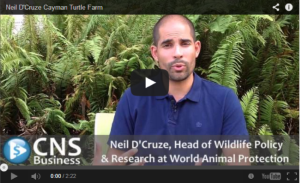Search Results for 'turtle farm'
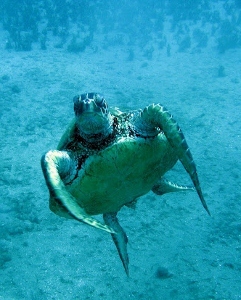
60 year old turtle to be freed after 30 years at farm
 (CNS): The Cayman Turtle Farm has announced its intention to release one of its oldest breeders back into the ocean. The decision to release such a mature animal, the farm said, was to mark the diamond jubilee celebrations of Elizabeth II on Saturday, 2 June. The adult turtle, which weighs over 600lbs and is estimated to be sixty years old, has been part of the farm’s breeding stock for over thirty years. The mature male turtle will be fitted with a tracking tag and released into the North Sound at the former Safehaven site, after which scientists will follow his progress and assess his re-introduction in to the wild after three decades in captivity.
(CNS): The Cayman Turtle Farm has announced its intention to release one of its oldest breeders back into the ocean. The decision to release such a mature animal, the farm said, was to mark the diamond jubilee celebrations of Elizabeth II on Saturday, 2 June. The adult turtle, which weighs over 600lbs and is estimated to be sixty years old, has been part of the farm’s breeding stock for over thirty years. The mature male turtle will be fitted with a tracking tag and released into the North Sound at the former Safehaven site, after which scientists will follow his progress and assess his re-introduction in to the wild after three decades in captivity.
Dubbed "Sir Thomas Turtleton" in honour of the jubilee, he is the first turtle of this age and size to be released into the wild by the Cayman Turtle Farm. Sir Thomas will be part of the farm’s “Tag and Track” release programme, which was inaugurated earlier this year with the release of “Jerry”, the farm’s first satellite-tracked turtle.
In the tag and track programme, green sea turtles fitted with satellite transmitters are released into the ocean and monitored online. When the animal surfaces during a transmission period, the tag sends a signal to a satellite, indicating its location.
As Sir Thomas Turtleton travels following his release, the team at the Cayman Turtle Farm will be able to use the data as signs that he has successfully survived the re-introduction to the wild, and scientists, both at the Farm and in like-minded organisations around the world, can view and assess the turtle's migration path.
It is hoped that the data from Sir Thomas Turtleton’s track may be compared with the track of younger released turtles and determine the behaviour of older turtles versus the younger turtles usually released by the Cayman Turtle Farm at between two and three years of age.
“We felt this turtle release would be a fitting celebration of Her Majesty Queen Elizabeth’s Diamond Jubilee by the Cayman Turtle Farm as it celebrates both history and progress,” said Chief Marketing Officer Tina Trumbach. “Sir Thomas Turtleton has made a tremendous contribution to the breeding and conservation efforts at the Cayman Turtle Farm over the years, and we felt it was an opportune time to celebrate his history and release him back to his original habitat. By making his release a part of our Tag and Track release programme, we can also contribute to progress in research on mature turtles released into the wild.”
The public is invited to attend the unusual release and thereafter it Sir Thomas survives he can be followed online at seaturtle.org or follow the Turtle Farm webpage link www.turtle.ky/current-project
Farm releases only eight turtles into wild
(CNS): The Cayman Turtle farm released only eight yearling green sea turtles into the wild last month at Seven Mile Beach, despite the release being an important part of its conservation efforts. Sending the new crop on their way, however, Turtle Farm managers said most of the animals return annually to the Cayman Islands to nest and will lay an average of between 500 and 1,000 eggs per year for the next 20 years. The latest group made their way across the sands, instinctively imprinting the local landscape, before gaining the water to begin a new life, officials said. The turtles may now go as far afield as Central and South America, and even the coastal waters of Florida, going some way to assist the survival of the endangered species.
Managing Director of the Cayman Turtle Farm: Island Wildlife Encounter, Tim Adam, described the release as “a kind of culmination and a confirmation of what we do, of what we want to achieve". He said, "We are making a difference here and in the world around us, and that is something Cayman can be proud of.”
Each year the farm releases a number of young turtles during the Pirates Week Festival and members of the public enter a raffle for the opportunity to be the ones that send the turtles back to the ocean.
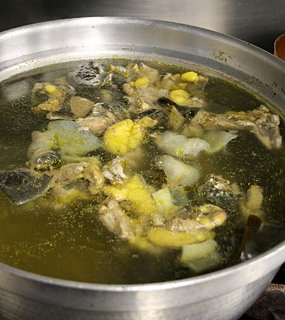
Turtle stocks can sustain sale, says farm
 (CNS): The Cayman Turtle Farm has announced that it is holding holiday-season sale on turtle stew and menavelin. Tim Adam, managing director of the farm said that after a review of production it was believed that an increase in supplies could be sustained, if only temporarily for the season. Although it is anticipated prices will go back up in the New Year the turtle boss said this sale would allow food vendors to offer the traditional Caymanian dish on menus for Pirate’s Week, Thanksgiving, Christmas, and New Year gatherings. Adam said the stocks still had to be managed but the farm appreciated the need to try and reduce prices given the time of year.
(CNS): The Cayman Turtle Farm has announced that it is holding holiday-season sale on turtle stew and menavelin. Tim Adam, managing director of the farm said that after a review of production it was believed that an increase in supplies could be sustained, if only temporarily for the season. Although it is anticipated prices will go back up in the New Year the turtle boss said this sale would allow food vendors to offer the traditional Caymanian dish on menus for Pirate’s Week, Thanksgiving, Christmas, and New Year gatherings. Adam said the stocks still had to be managed but the farm appreciated the need to try and reduce prices given the time of year.
“We understand the importance and sentimental attractions of Caymanian culinary traditions, particularly during Pirate’s Week and the holidays, which bear an even greater traditional significance,” said Adam. “We are happy to offer the community the chance to maintain — and remind others of — their uniquely Caymanian identity and all the pleasures and cultural expressions that implies.”
He explained that the Turtle Farm had reviewed its production programme and concluding that increased supplies could be sustained, if only temporarily, and that soon after the New Year, prices were likely to return to higher levels.
“We still need to manage consumption of this traditional product, in order to keep supplies at a sustainable level. By and large, the community has supported us, and people seem to understand and accept the need for a programme of careful maintenance and conservation,” Adam revealed.
The new temporary prices are $10 per pound for stewing meat and $8 per pound for menavelin and it is being sold in five-pound lots. Prices of turtle meet were increased in February when the cost of turtle stew went from its years-long level of $5.40 per pound to $16, and menavelin from $4 to $12 as part of efforts to reduce consumption and enable replenishment of stocks at the Turtle Farm.
Model of turtle schooner showcased at farm
(CNS): A model of the Goldfield, one of the Cayman Islands historical turtle schooners is now on display at Boatswain Beach. The detailed model built by Dr. William “Bill” Hrudey has been placed in a showcase in the reception area of the Cayman Turtle Farm as a celebration of the country’s seafaring past officials at the farm said. The model was finished in 2002 and took Dr Hrudey over 6 months of full time, painstaking work and countless hours of archival research to ensure that every detail was accurate and true to the original.

Farm cuts price on bulk-buy turtle meat
 (CNS): The Cayman Turtle Farm announced today that it has introduced a new volume discount on turtle meat. Despite recently increasing the price, explained at the time as an effort to reflect the true cost of producing the meat, the farm is now offering restaurants and residents 25 percent discount for bulk buy. All customers, including restaurants, purchasing at least twenty pounds of meat products will be able to get the discount, the farm said in a statement. The farm is also offering the discount on mixed products.
(CNS): The Cayman Turtle Farm announced today that it has introduced a new volume discount on turtle meat. Despite recently increasing the price, explained at the time as an effort to reflect the true cost of producing the meat, the farm is now offering restaurants and residents 25 percent discount for bulk buy. All customers, including restaurants, purchasing at least twenty pounds of meat products will be able to get the discount, the farm said in a statement. The farm is also offering the discount on mixed products.
The farm said customers buying ten pounds of stew, five pounds of steak, plus five pounds of menavelin will get the 25% reduction. The volume discount price for turtle stew will now be $12.00 per pound, menavelin $9.00 per pound, bones $4.50 per pound and turtle steak $20.25 per pound.
Promoting these new volume discounts, Managing Director of the Cayman Turtle Farm Tim Adam said he hoped the discounts on bulk purchases would encourage restaurants to reduce their prices. “We hope they will take advantage of the opportunity to offer turtle meals at lower prices to the general public,” he said.
The MD did not say whether the new reduction will impact the sustainability of production, which was one of the reasons cited for the original price increase earlier this year.
When the farm announced the significant increases in February, Adam had said the price had been far below the cost to produce it and the facility was constantly losing money as a result.
“Looking closely at the farm operations it was immediately clear that the price being charged for turtle meat would not allow the proper operation of the farm. The supply of turtle meat in Cayman is in jeopardy and could dry up in the very near future without significant re-investment in the turtles, their feeding and care or even the farm facilities,” he said at the time, adding that a reasonable pricing structure was the first step in being able to properly re-invest in the farm.
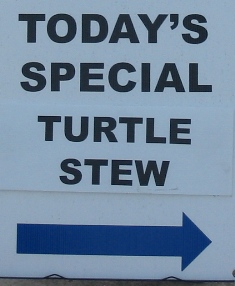
Turtle meat discount over, say farm officials

The new director added that the farm was getting used to its new demand levels and would be improving levels of production to meet the adjustments in customers purchasing behaviour. Adam said the new prices which were now in place reflected the real cost of the product.
While there is also a need to reduce the amount of turtles the farm slaughters to ease pressure on the troubled breeding programme, the farm’s main goal is that price matches the cost of production.
“Our goal is to ensure that when we sell meat the farm is not subsidizing the sale,” Adam stated adding that the new prices were set at the level that covers the cost of producing a pound of each type of turtle meat product.
“Since that time, turtle meat sales have continued, but of course at a slower rate than before the price increase.” He explained that the last meat production run built up a small overstock of harvested turtle meat. To sell off the overstock, the farm sold stew between yesterday evening and this morning at a 25% discount to specifically selected customers.
Although there is no more sale stock left anyone wanting turtle meet can call the farm’s meat production chief Malachi Anglin at 925-8622 to find out what products are still available and to place orders for future meat production runs.
Wild green turtle poached from WB beach
(CNS): Poachers are believed to have illegally taken a nesting green turtle from a beach in West Bay. While on patrol recently the Department of Environment (DoE) Chief Conservation Officer Mark Orr said he discovered signs that the adult female was dragged off when she came onto the beach to lay eggs. “This incident was discovered on 6 October,” he said, adding that it was not an isolated incident. “This summer, DoE volunteers also discovered parts of a slaughtered loggerhead turtle in North Side. We don't believe these are isolated incidents; we believe other, undetected incidents have also taken place.”
The DoE also said that results from new and ongoing research show the urgency of reducing the illegal take of green turtles from Cayman's small nesting population as there is evidence that significant numbers of the endangered wild marine creature are being poached.
Research involves a night-time tagging project, funded by the UK Darwin Initiative and launched in June 2014, and a daytime beach monitoring programme that began in 1999. DoE Research Officer Dr Janice Blumenthal said there are serious concerns about the population despite the increase in nest numbers since 1999, when daytime monitoring of beaches in Grand Cayman started.
“We've seen an increase from a low of only one nest in 1999, to a high of 181 nests in 2012,” she said.
While the daytime monitoring establishes the number of nests each year, it only provides one side of the story – it does not allow a precise determination of the number of females nesting. This is where the tagging of turtles proves useful.
“The true number of turtles nesting each year in Grand Cayman was unknown until the Department began its Darwin-funded, night-time tagging programme,” Dr Blumenthal said. “We know that the 131 green turtle nests found in Grand Cayman so far this year were not laid by 131 turtles. Our challenge was to tag and individually identify nesting green turtles to determine how many females laid these nests,” she added.
By cross referencing the new night-time tagging data with information gleaned from the department's longstanding daytime monitoring efforts, the DoE is now refining estimates of the number of green turtles in the nesting population, and better estimating the contribution of the Cayman Turtle Farm to wild nesting populations, with the goal of protecting nesting turtles. The purpose of the daytime monitoring is to establish the number of turtle nests laid each year, in order to indicate population trends.
Female green turtles can each lay up to six nests per season; and they typically nest every two to three years, rather than every year.
DoE staff and volunteers tagged 21 green turtles in 2014 and, while the research is ongoing, preliminary results suggest that these turtles represent the vast majority of this year's green turtle nesting population, with each turtle laying up to six nests. This indicates that the illegal take of turtles poses a serious problem, because the overall population size is extremely low.
“It's clear from our preliminary results that populations are even smaller than previously thought, and thus more vulnerable to threats such as illegal take,” Dr Blumenthal warned.
Losing even one turtle means six fewer nests – and, as turtles lay more than 100 eggs per nest, this means 600 fewer eggs in that turtle's nesting year. This reduction affects the population for every year that the turtle could have continued to nest.
Orr said that, because of the very low numbers of nesting turtles on our beaches, DoE considers illegal take of turtles to be one of the most serious conservation offences. Past cases of this nature have resulted in fines and prison sentences, and any equipment including vehicles and boats used in the offence may be confiscated by the courts. Anyone with information regarding illegal take of turtles is asked to make a report to Mark Orr by calling 916-4271; 911; or Crime Stoppers at 800-TIPS.
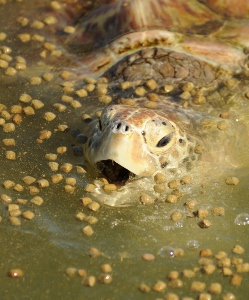
Turtle expert calls for change at CTF
 (CNS): A leading marine turtle specialist has waded in on the debate about the Cayman Turtle Farm and the need to transition the controversial facility from supplying meat to genuine conservation. Marydele Donnelly, currently the director of international policy at the Sea Turtle Conservancy who has worked as a conservation advocate for more than 30 years said the farm poses a threat to the Cayman economy and the conservation of wild green sea turtle populations. Donnelly who was also the program officer at the IUCN Marine Turtle Specialist Group and director of the Sea Turtle Conservation Program for the Ocean Conservancy has co-authored a paper about the farm with Dr Neil D’Cruze, from World Animal Protection and Rachel Alcock.
(CNS): A leading marine turtle specialist has waded in on the debate about the Cayman Turtle Farm and the need to transition the controversial facility from supplying meat to genuine conservation. Marydele Donnelly, currently the director of international policy at the Sea Turtle Conservancy who has worked as a conservation advocate for more than 30 years said the farm poses a threat to the Cayman economy and the conservation of wild green sea turtle populations. Donnelly who was also the program officer at the IUCN Marine Turtle Specialist Group and director of the Sea Turtle Conservation Program for the Ocean Conservancy has co-authored a paper about the farm with Dr Neil D’Cruze, from World Animal Protection and Rachel Alcock.
D’Cruze has been spearheading the WPA campaign to transform the turtle farm after the UK based animal rights charity exposed a catalogue of problems at the farm. In the new scientific paper published by the Journal of Agricultural and Environmental Ethics entitled “The Cayman Turtle Farm: Why We Can’t Have Our Green Turtle and Eat it Too.” Focuses on the concerns that by supplying meat the farm is perpetuating and promoting the consumption of this endangered species.
“I am proud to have worked on such an important research paper which highlights the threats that the Cayman Turtle Farm poses to both the Cayman economy and the conservation of wild green sea turtle populations, “ Said Donnelly. “Our arguments are clear: the millions of dollars ploughed intothe Cayman Turtle Farm each year could be much better spent on protecting green sea turtles in the wild, using tried and tested methods which have been shown to yield real results.”
The WPA campaign, launched in 2012, has already highlighted severe animal welfare concerns associated with the Farm which is now the place in the world which raises endangered sea turtles for meat. This new paper adds conservation concerns to the growing list of rationale for why the Cayman Turtle Farm cannot carry on with its current mode of operation. The authors put forward the case that sea turtle farming comes at an astronomic economic cost.
The paper reiterates the WPA’s call for the Farm to transition into a sea turtle rehabilitation center that fully protects the animals in its care. The authors cite the example of Kelonia on Réunion Island, a facility which has successfully and profitably transitioned from a commercial sea turtle farm to a rehabilitation and education facility.
This new research paper also echoes some of the findings in the recent Ernst & Young report which recommends significant operational change at the Cayman Turtle Farm as it sucks some $10million a year from the public purse.
“World Animal Protection was delighted to read the findings of the recent Ernst & Young report,” Said D’Cruze. “It echoes the findings contained within our new scientific paper for the Journal of Agricultural and Environmental Ethics.”
The WPA also revealed that the Cayman Islands Government has still not formally responded to the charity after it had engaged in talks with the WPA over potential changes at the farm as well as a survey conducted by the DoE about the level of demand for the meat.
“We once again urge the Cayman Islands Government to take an objective look at this growing body of evidence and to transition away from sea turtle farming as a conservation tool,” D’Cruze said.
The scientific paper can be downloaded here:
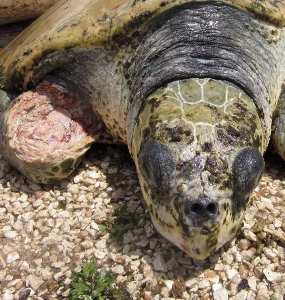
CIG has failed to address turtle welfare, says charity
 (CNS): A UK-based international charity has said the Cayman government has failed to address the on-going animal welfare issues at the Cayman Turtle Farm despite earlier promising talks with the current administration. World Animal Protection said its year-long closed door discussions with the government about the controversial Farm and the conditions there have broken down as the charity has received no response for more than two months in connection with issues discussed during talks in July. Although some progress had been made on the myriad problems with the facility, the charity says government has failed to act on the serious welfare issues but they can no longer be ignored.
(CNS): A UK-based international charity has said the Cayman government has failed to address the on-going animal welfare issues at the Cayman Turtle Farm despite earlier promising talks with the current administration. World Animal Protection said its year-long closed door discussions with the government about the controversial Farm and the conditions there have broken down as the charity has received no response for more than two months in connection with issues discussed during talks in July. Although some progress had been made on the myriad problems with the facility, the charity says government has failed to act on the serious welfare issues but they can no longer be ignored.
It said overcrowding, cannibalism, injuries and disease among the almost 10,000 endangered green sea turtles at the Farm remain a significant concern.
Discussions with the PPM administration started over a year ago and World Animal Protection’s CEO Mike Baker said early discussions highlighted key areas of mutual concern over animal welfare conditions related to the Farm, such as overcrowding, the possible introduction of infectious diseases into the wild through the Farm’s turtle release program, and the illegal poaching of wild sea turtles.
In November last year the farm suspended the turtle release programme as it finally acknowledged that releasing the farmed turtles could put the wild population at risk of infectious disease. Alongside the cancelation of that programme the Department of the Environment received funding from the UK to investigate the true scale of Caymanian demand for sea turtle meat.
But the conditions in which turtles are being kept at the farm remain little changed and although there is now a full time vet at the facility the husbandry issues have not been addressed.
“Despite highly positive discussion nearly two months ago, we are disappointed that the CIG has failed to provide World Animal Protection with any updated formal response on the Farm’s conditions,” said World Animal Protection’s CEO, Mike Baker. “It is impossibleto see how progress can be made without communication and participation from both sides,” he added as he stated that talks between the charity and government had broken down.
“After more than a year of patient engagement and talks behind closed doors, it is now time for the CIG to act. The root causes of acute animal suffering at the Farm, such as the severe overcrowding of turtles there, simply cannot be ignored any longer,” Baker added.
The charity which published a damning report just under two years ago about conditions at the farm is advocating to that the Farm transition from a butcher’s shop into a rehabilitation and conservation facility that fully protects sea turtles.
Following the statement on Friday from WAP, Cayman News Service contacted the Farm as well as the ministers and their officials from tourism and the environment but we are still awaiting a response.
Watch video interviews with Neil D’Cruse, WAP Head of Wildlife Policy and Research
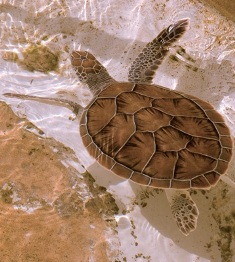
UK Tory MP backs no turtle meat for tourists
 (CNS): A British Tory MP was in the Cayman Islands this week to lend his support to efforts being spearheaded by a UK animal charity to transition the Cayman Turtle Farm from a butcher's shop into a conservation facility. Dr Matthew Offord is also backing the campaign to persuade local restaurants to take turtle off the menu and stop promoting the meat to visitors. The Conservative back-bencher hosted a reception at Grand Old House, the first restaurant to stop promoting the meat, with the World Animal Protection (formerly the World Society for Protection of Animals) as the charity and the Cayman government resumed talks about the issue.
(CNS): A British Tory MP was in the Cayman Islands this week to lend his support to efforts being spearheaded by a UK animal charity to transition the Cayman Turtle Farm from a butcher's shop into a conservation facility. Dr Matthew Offord is also backing the campaign to persuade local restaurants to take turtle off the menu and stop promoting the meat to visitors. The Conservative back-bencher hosted a reception at Grand Old House, the first restaurant to stop promoting the meat, with the World Animal Protection (formerly the World Society for Protection of Animals) as the charity and the Cayman government resumed talks about the issue.
The ongoing animal welfare problems associated with the Cayman Turtle Farm, which is now the last place in the world commercially farming endangered green sea turtles, were at the top of the agenda at the event. Offord is a member of the UK parliament’s Environmental Audit Select Committee who is offering his support to talks about changes at the Farm.
Offord was one of the UK politicians on the committee involved in the Sustainability in the UK Overseas Territories report, which supported the findings of the WPA and its concerns about conditions at the Farm. The Committee has also raised the issue of the UK Government’s role as part of its ongoing discussions with the Cayman Islands Government.
Offord noted conservation efforts in Cayman and what he described as the "positive dialogue that is occurring between World Animal Protection and the Cayman Islands Government in addressing issues of sustainability at the Cayman Turtle Farm," adding that he was looking forward to its "cooperation in the future”.
Talks with the government will aim to build on positive measures agreed upon earlier this year, include the funding of research into the true local demand for turtle meat and the effectiveness of the Farm’s annual turtle release and the current suspension of that programme until the results of such research are available.
Dr Neil D’Cruze, Head of Wildlife Policy and Research at World Animal Protection, said, “We commend Dr Offord for his admirable advocacy on behalf of animal welfare, and are grateful to have had the opportunity to meet with Caymanian stakeholders to continue our discussions on how best to achieve positive change for green sea turtles.”
World Animal Protection has long advocated for the Cayman Turtle Farmnot to close but to transition into a true rehabilitation and release facility that fully protects sea turtles.
Concerned that the farm has no idea what the real demand for the meat is even from locals, De Cruze also said he was delighted to hear that the Department of the Environment has received funding from the UK's department of food and rural affairs' Darwin initiative to begin a comprehensive survey of that demand and research into the genetic profile of turtles nesting on the beaches to identify the connections of the local wild turtles to the Farm.
That project is unrelated to the WAP campaign and part of the DoE's broader research work into the endangered species and their survival in the wild. It is being led by Dr Ana Nuno from the University of Exeter and is expected to provide the first truly objective information about the origin of turtles that are breeding in local waters as well as get a true assessment of how much demand there is for meat and the issues surrounding poaching.
The WAP maintains that the CTF slaughters animals without properly assessing demand and also keeps huge numbers of the animals without knowing the true level of consumption and whether it is necessary to breed so many. D'Cruze said that any figures that can give a truer picture of how much and how many local people do eat the meat may help reduce the numbers held at the Farm.
Understanding that the effort to transition the facility to conservation will be a long process, he said that simply reducing the numbers, which are estimated to currently be more than 9,000 animals held at the Farm, would be a step in the right direction.
